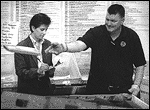Working Smart, Working Safe
Ergonomics Specialist Mallory Lynch Is on the Case
By Julia Sommer, Public Affairs
Posted January 27, 1999
 Ergonomic specialist Mallory Lynch observes mail processor Gary Stetson at work. Campus Mail Services handles 23 million pieces of mail a year. Peg Skorpinski photo. |
Today, thanks to the increasing cost of repetitive strain injuries in the workplace, Berkeley has its own ergonomics specialist -- Mallory Lynch.
To test the effectiveness of using a specialist, University Health Services hired Lynch in October to work for two years at 60 percent time. Her assignment: provide technical support to departmental computer workstation evaluators, perform post-injury worksite evaluations and conduct ergonomic assessments and training in high-risk, non-computer work environments.
"It's my dream job," says Lynch, a former Cal tennis star. "I've always wanted to be part of a team that solves problems for a variety of occupations, and I love to help alleviate people's pain."
Lynch's first major project has been to create an ergonomic plan for Mail Services, where many staff, because of the physical nature of their work, experience back and other injuries. Her recommendations -- which will be refined by Mail Services staff focus groups -- include modifying equipment, redesigning some work areas and learning less stressful ways to load and unload vans.
She is also working on campus recommendations for computer pointing devices (track balls and mice) that will be available for testing and purchase at Mainly Stationery and Scholar's Workstation on campus.
"Most of the computer injuries I've seen so far stem from staff not understanding how best to set up their workstations," she notes.
Before coming to Berkeley, Lynch worked in a physical therapy office, where she provided workstation evaluations, back injury prevention trainings and computer ergonomic classes.
She received two degrees in physical education from Berkeley -- her BA, in '81, and her MA in '83.
Barbara Pottgen, the UHS health educator in charge of ergonomics for staff and faculty, is overjoyed to have help in her burgeoning area of responsibility. About half the injuries on campus, she says, are related to poor ergonomics.
Since 1994, Pottgen has trained over 200 staff in 115 departments to be computer workstation evaluators. After an initial dip in computer-related repetitive strain injuries on campus, she says, the numbers are creeping up again.
"Every day, more people are working more hours at computers," Pottgen explains. "The human and financial cost can be reduced if people work at well-designed workstations, rotate job tasks and report injuries as soon as possible."
Pottgen conducts a four-hour training for new computer workstation evaluators each semester. The next one is Feb. 18 (see box).
Starting this semester, she will also provide continuing education for computer workstation evaluators once a semester.
Jolene Adams, computing resource manager in chemistry, was one of the first evaluators. "The challenge is to create a safe workstation without spending too much money," she says.
She uses a demonstration computer workstation to educate staff and faculty about ergonomically correct ways to work.
In collaboration with workers compensation, UHS offers departments three-year, no-interest loans for new workstations and accessories. For information call 642-8410.
Computer workstation furniture and accessories are available at Mainly Stationery. Call 642-1073 for an appointment.
![]()
![]()
January 27 - February 2, 1999 (Volume 27, Number 20)
Copyright 1999, The Regents of the University of California.
Produced and maintained by the Office of Public Affairs at UC Berkeley.
Comments? E-mail berkeleyan@pa.urel.berkeley.edu.